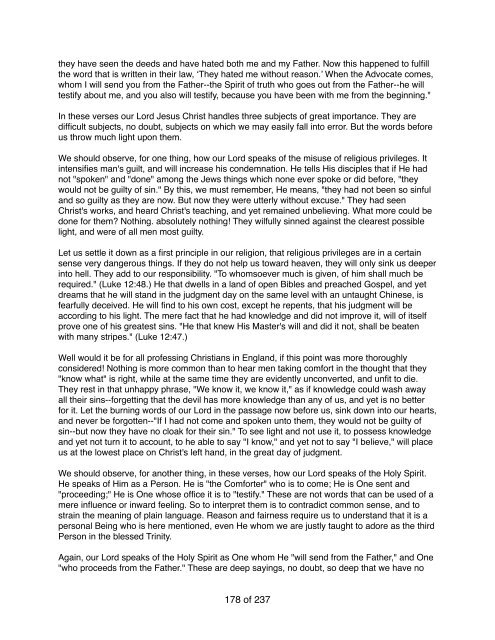J. C. Ryle John
John Charles Ryle (May 10, 1816 - June 10, 1900) was an evangelical Anglican clergyman and first Bishop of Liverpool. He was renowned for his powerful preaching and extensive tracts.
John Charles Ryle (May 10, 1816 - June 10, 1900) was an evangelical Anglican clergyman and first Bishop of Liverpool. He was renowned for his powerful preaching and extensive tracts.
Create successful ePaper yourself
Turn your PDF publications into a flip-book with our unique Google optimized e-Paper software.
they have seen the deeds and have hated both me and my Father. Now this happened to fulfill<br />
the word that is written in their law, ‘They hated me without reason.’ When the Advocate comes,<br />
whom I will send you from the Father--the Spirit of truth who goes out from the Father--he will<br />
testify about me, and you also will testify, because you have been with me from the beginning."<br />
In these verses our Lord Jesus Christ handles three subjects of great importance. They are<br />
difficult subjects, no doubt, subjects on which we may easily fall into error. But the words before<br />
us throw much light upon them.<br />
We should observe, for one thing, how our Lord speaks of the misuse of religious privileges. It<br />
intensifies man's guilt, and will increase his condemnation. He tells His disciples that if He had<br />
not "spoken" and "done" among the Jews things which none ever spoke or did before, "they<br />
would not be guilty of sin." By this, we must remember, He means, "they had not been so sinful<br />
and so guilty as they are now. But now they were utterly without excuse." They had seen<br />
Christ's works, and heard Christ's teaching, and yet remained unbelieving. What more could be<br />
done for them? Nothing. absolutely nothing! They wilfully sinned against the clearest possible<br />
light, and were of all men most guilty.<br />
Let us settle it down as a first principle in our religion, that religious privileges are in a certain<br />
sense very dangerous things. If they do not help us toward heaven, they will only sink us deeper<br />
into hell. They add to our responsibility. "To whomsoever much is given, of him shall much be<br />
required." (Luke 12:48.) He that dwells in a land of open Bibles and preached Gospel, and yet<br />
dreams that he will stand in the judgment day on the same level with an untaught Chinese, is<br />
fearfully deceived. He will find to his own cost, except he repents, that his judgment will be<br />
according to his light. The mere fact that he had knowledge and did not improve it, will of itself<br />
prove one of his greatest sins. "He that knew His Master's will and did it not, shall be beaten<br />
with many stripes." (Luke 12:47.)<br />
Well would it be for all professing Christians in England, if this point was more thoroughly<br />
considered! Nothing is more common than to hear men taking comfort in the thought that they<br />
"know what" is right, while at the same time they are evidently unconverted, and unfit to die.<br />
They rest in that unhappy phrase, "We know it, we know it," as if knowledge could wash away<br />
all their sins--forgetting that the devil has more knowledge than any of us, and yet is no better<br />
for it. Let the burning words of our Lord in the passage now before us, sink down into our hearts,<br />
and never be forgotten--"If I had not come and spoken unto them, they would not be guilty of<br />
sin--but now they have no cloak for their sin." To see light and not use it, to possess knowledge<br />
and yet not turn it to account, to he able to say "I know," and yet not to say "I believe," will place<br />
us at the lowest place on Christ's left hand, in the great day of judgment.<br />
We should observe, for another thing, in these verses, how our Lord speaks of the Holy Spirit.<br />
He speaks of Him as a Person. He is "the Comforter" who is to come; He is One sent and<br />
"proceeding;" He is One whose office it is to "testify." These are not words that can be used of a<br />
mere influence or inward feeling. So to interpret them is to contradict common sense, and to<br />
strain the meaning of plain language. Reason and fairness require us to understand that it is a<br />
personal Being who is here mentioned, even He whom we are justly taught to adore as the third<br />
Person in the blessed Trinity.<br />
Again, our Lord speaks of the Holy Spirit as One whom He "will send from the Father," and One<br />
"who proceeds from the Father." These are deep sayings, no doubt, so deep that we have no<br />
178 of 237




